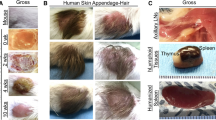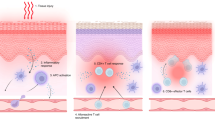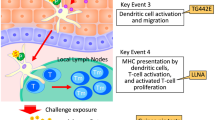Abstract
ALLOGRAFT rejection is usually grouped with delayed hypersensitivity, acquired cellular resistance to infection and some types of auto-immune disease as a form of cell-mediated immunity, implying that all these phenomena may share a common immunological mechanism. The rejection of skin allografts is generally accompanied by the development of delayed-type hypersensitivity to graft antigens. Reactions having the time-course and macroscopic and microscopic features of skin reactions in delayed-type hypersensitivity have been elicited by injecting donor antigen (in the form of lymphoid cells or extracts thereof) into sensitized humans, guinea-pigs, hamsters, dogs and rats1–3. Similar reactions could not be elicited in mice1. Here we describe the induction of delayed hypersensitivity reactions in the footpads of mice. Because resistance to isografts of chemically induced tumours in mice may also be a form of cell mediated immunity4, we have also tested whether similar reactions can be elicited after tumour isografting in mice.
This is a preview of subscription content, access via your institution
Access options
Subscribe to this journal
Receive 51 print issues and online access
$199.00 per year
only $3.90 per issue
Buy this article
- Purchase on Springer Link
- Instant access to full article PDF
Prices may be subject to local taxes which are calculated during checkout
Similar content being viewed by others
References
Brent, L., Brown, J. B., and Medawar, P. B., Proc. Roy. Soc., B, 156, 187 (1962).
Brent, L., and Medawar, P. B., Brit. Med. Bull., 23, 55 (1967).
Streilein, J. W., and Barker, C. F., J. Immunol., 98, 601 (1967).
Alexander, P., and Fairley, G. H., Brit. Med. Bull., 23, 86 (1967).
Davies, D. A. L., Immunology, 11, 115 (1966).
Nelson, D. S., and Mildenhall, P., Austral. J. Exp. Biol. Med. Sci., 45, 113 (1967).
Mildenhall, P., and Nelson, D. S., Brit. J. Exp. Path., 49, 170 (1968).
Snell, G. D., Hoecker, G., Amos, D. B., and Stimpfling, J. H., Transplantation, 2, 777 (1964).
Old, L. J., Boyse, E. A., Clarke, D. A., and Carswell, E. A., Ann. NY Acad., Sci., 101, 80 (1962).
Old, L. J., Benacerraf, B., Clarke, D. A., Carswell, E. A., and Stockert, E., Cancer Res., 21, 1281 (1961).
Dekaris, D., and Allegretti, N., Transplantation, 6, 296 (1968).
Apffel, C. A., and Peters, J. H., J. Nat. Cancer Inst., 39, 1129 (1967).
Wang, M., and Halliday, W. J., Brit. J. Cancer, 21, 346 (1967).
Oettgen, H. F., Old, L. J., McLean, E. P., and Carswell, E. A., Nature, 220, 295 (1968).
Author information
Authors and Affiliations
Rights and permissions
About this article
Cite this article
HOY, W., NELSON, D. Delayed-type Hypersensitivity in Mice after Skin and Tumour Allografts and Tumour Isografts. Nature 222, 1001–1003 (1969). https://doi.org/10.1038/2221001a0
Received:
Revised:
Issue Date:
DOI: https://doi.org/10.1038/2221001a0
Comments
By submitting a comment you agree to abide by our Terms and Community Guidelines. If you find something abusive or that does not comply with our terms or guidelines please flag it as inappropriate.



